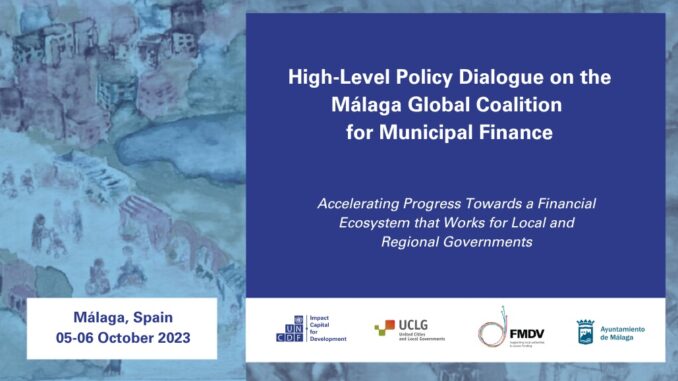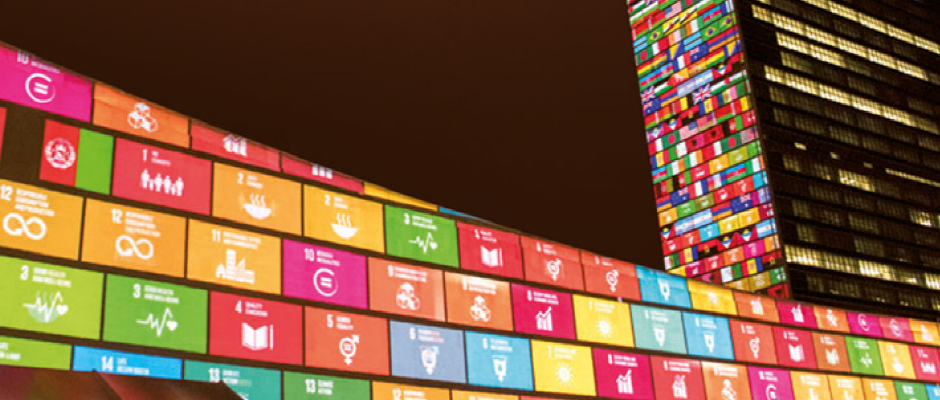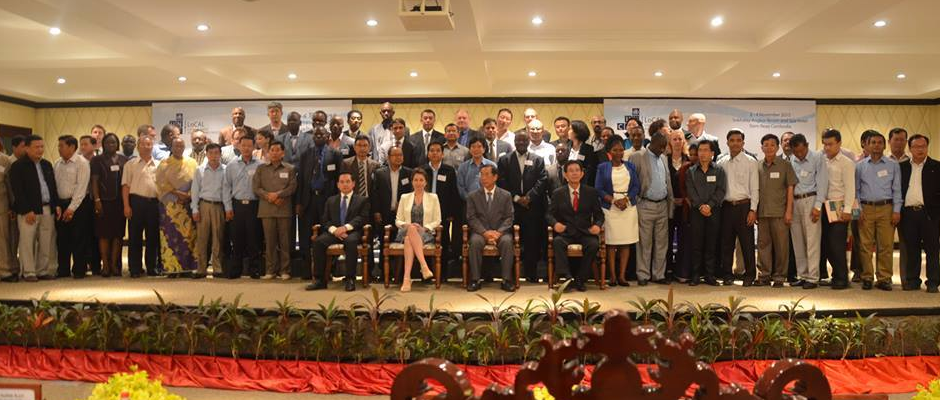
We are living in a time of great economic, social and geopolitical uncertainty in which developing countries need to manage three simultaneous transitions: (1) urban and rural transition ensuring inclusive and sustainable spaces in the context of rapid demographic change; (2) green transition towards net zero and environmental sustainability including a circular economy; (3) productive transition from low to high productivity levels that generate the wealth to be invested in improved living standards and ensure public services for all.
These three demands generate contradictory pressures for policy makers. The key to resolving them is through a territorial approach because these imperatives are manifested differently across national regions and localities.
Urbanization, resilience and inclusive growth
More than half of the world’s population now live in urban areas, this is projected to reach more than two thirds by 2050. Growing urbanization is accompanied by increasing inequality, social exclusion and marginalization specially in cities peripheries and slum areas. Against this backdrop cities and local governments become essential institutions to drive these transitions, which require significant infrastructure investment. Yet many cities in developing countries will not be able to raise the required finance – the projected gap is US$1.2-2.3 trillion. This is further exacerbated by funding needs for COVID-19 recovery given the urban poor were heavily impacted in terms of reduced household income associated with financial constraints on local government services. According to a World Bank study of the impact of COVID-19 on municipal revenues in several cities in the global South, own source revenues declined anywhere between 5 and 30 percent in 2020,subsequently leading to a reduction in subnational government capital investments by almost 2/3.
The ongoing climate crisis, with rising global temperatures, natural disasters, and soil degradation also intensifies the funding gap. Developing countries and regions are heading for urbanization levels of 80% (at which level urbanization tends to stabilize), and need to urgently upgrade their built environment to reduce emissions, adapt and build resilience while still increasing their productivity. These transitions require a shift to more efficient public and private institutions, increased fiscal space, greater own source revenues, and deeper domestic capital markets. Improved fixed capital formation and larger fiscal space as a proportion of gross domestic product (GDP) are indications of the required transformation. For example, a ten percent increase in infrastructure development contributes to one percent growth in the long term. According to the Least Developed Countries (LDC) report from 2021, the average private investment for the 38 LDCs in the post-COVID world would need to more than double from US$457 billion in 2017 to US$1,050 billion in 2030, and about one-fourth of total investments should be financed by the public sector (26 percent) for the realization of the SDGs by 2030. Local infrastructure investment is transformative finance that is required for all countries to attain planetary health and social justice alongside productivity and define development through a green and inclusive transition.
Advancing the three intertwined transitions demands a financial ecosystem that enables cities, local and regional governments to playa full and sometimes leading role. Otherwise, we may not achieve the SDGs.
The Málaga Global Coalition for Municipal Finance
Inspired by this belief, the Málaga Global Coalition for Municipal Finance was created in 2018 by the United Nations Capital Development Fund (UNCDF) and the United Cities and Local Governments (UCLG), in collaboration with its technical partner the Global Fund for Cities Development (FMDV). UNCDF is the United Nations hub for subnational finance. The Málaga Coalition aims to equip subnational governments with financial and technical support to realize their full potential in the provision of sustainable public services and infrastructures to drive the required transformation.
In this context, UNCDF’s 2022 flagship publication “Local Government Finance is Development Finance” provides further evidence that the current global financial ecosystem is not working for cities and local governments and demonstrates how local “financeable transformative” investments (rather than merely “bankable commercial” projects) are central to financing sustainable urbanization. As such, local and regional governments should be considered as attractive partners for investment, and as legitimate interlocutors within high-level international dialogues on the economic and financial system, governance and regulations. In this spirit, the Pact for the Future of Humanity of UCLG has raised the bar and set the tone for a new momentum of the local multilateral system to contribute to dialogues, actions and partnerships for a more inclusive and fair global finance and economy that works for the people, the planet and the government.
The Málaga Coalition policy agenda is proposed as a concrete path to developing the required financial ecosystem, which includes five interlinked building blocks:
- Intergovernmental fiscal transfers as vehicles for development finance, in particular climate finance;
- Increased focus on local and regional government own source revenues to rebuild local fiscal space;
- Domestic capital markets that are accommodating to local and regional governments;
- City-friendly investment funds which understand the specific financial and political reality of the local and regional governments and support their investment objectives;
- Guarantee funds for city investments that provide confidence to financial institutions and mitigate pressure on sovereign balance sheets.
These five connected elements will not only address cities’ and local governments’ financing gaps, they will also speed up achievement of the SDGs, Paris Agreement, and New Urban Agenda. Since its inception, the Málaga Coalition has brought together diverse stakeholders and achieved significant results. The first Málaga Conference (2018) identified bottlenecks in the current financial ecosystem preventing cities and local governments from achieving the SDGs and agreed on the need for structural change. The second Málaga Conference (2019) launched an investment vehicle resulting from a Coalition request for proposals. After a competitive process, Meridiam was selected to manage the International Municipal Investment Fund (IMIF) which is accompanied by a UNCDF-managed Technical Assistance Facility (IMIF-TAF)that increases the capacity of local governments from emerging and developing contexts to access capital for their projects of infrastructures and services. From 2021 to 2022, two preparatory meetings for the Third Málaga Conference took place (the first one for local governments and their associations; the second one on national governments and development partners), which resulted in the roadmap of five policy areas for transforming municipal finance considering the evolving situation due to the pandemic.
Objectives of the third Málaga Conference
Hosted by the Ayuntamiento de Málaga, the upcoming Third Málaga Conference will bring together diverse leaders in local government finance, including mayors, government ministers, development banks, capital market authorities and commercial banks to take stock of the progress towards the Málaga Coalition policy agenda. Through dedicated roundtable discussions, the event will further unpack how the international financial environment and architecture can be reframed and better adapted for cities, local and regional governments and showcase concrete solutions illustrated by different high-impact cases. The Conference will also convene roundtables to discuss specific approaches, such as leveraging the cultural and creative sector for sustainable development, and to share findings of the third edition of the World Observatory on Subnational Government Finance and Investment (SNG-WOFI).In summary, the Third Conference of the Málaga Coalition aims to achieve the following objectives:
- Review the Málaga Coalition policy agenda and take stock of progress in each of the five building blocks since the first Málaga Conference;
- Showcase innovative approaches, mechanisms and instruments developed or implemented by Coalition members in line with the Málaga Coalition policy agenda;
- Understand risks and challenges and propose concrete solutions to accelerate progress;
- Define and advocate for the necessary policy reforms to drive towards a financial ecosystem that works for municipalities and local governments;
- Provide a roadmap towards the Fourth Málaga Conference.
Topics and Sessions
The Málaga Coalition has supported local and regional governments to make significant progress towards its policy agenda. Examples and progress are as follows, many of these best practices will be discussed and disseminated via knowledge products at this Conference:
1) Intergovernmental fiscal transfers as vehicles for development finance: Notable progress has been made since the first Málaga conference in the establishment of local government finance through national transfer systems as a vehicle for countries to effectively channel climate finance – particularly for adaptation. The UNCDF managed Local Climate Adaptive Living Facility (LoCAL) serves as a standard and internationally recognized country-based mechanism to channel climate finance to local governments in least developed countries. LoCAL combines performance-based climate resilience grants with technical and capacity-building support, and it has been endorsed by the LDC Expert Group to the UNFCCC as supplementary material to its National Adaptation Plan guidelines. LoCAL engaged more than 320 local governments in 17 countries since 2014, representing over 12.5 million people. In 2022 the LoCAL performance-based climate resilient grant methodology was acknowledged as an ISO standard 14093. Another example is the West African Economic and Monetary Union’s (WAEMU) directive of 2011 to reinforce decentralization and clarify the fiscal rules for local and regional governments. Six of its eight Member States have transposed it in their relevant legislation so far.[9]FMDV is operating a programme on subnational financing and fiscal decentralization with the WAEMU covering its eight member States plus Chad and Mauritania to raise ambition and innovate on decentralization policies and transfers to local and regional governments in those 10 countries. Finally, there is evidence that decentralized financing produced more effective responses to the COVID-19 pandemic. UNCDF is collaborating with the World Bank on scaling up IGFT as a form of development finance.
Predictable and stable intergovernmental fiscal transfers are most effective when combined with a comprehensive own source revenue policy.
2) Increased focus on local and regional government own source revenues to rebuild local fiscal space: IMF, UNCDF and UN-Habitat have developed and implemented a revenue enhancement action initiative in over 100 subnational governments in four countries in Eastern Africa. The initiative is designed to address the inefficiencies in subnational tax administration and applies specific actions stemming from the TADAT diagnostic in order to close the identified revenue potential gap. The initial results are encouraging, indicating a 30-50% increase in local own source revenue. Recognizing infrastructure assets as an important source of revenue, UNDESA and UNCDF have developed a UN handbook for local and national governments on infrastructure asset management. In 2021 alone, over 1,000 local government staff in Tanzania, Uganda, Nepal and Bangladesh have been trained to assess their asset management practices and improve own source revenue management. Examples of cooperation in this area are the EU, FMDV, UNCDF and Cities Alliance partnership with Kampala Capital City Authority and the UNCDF – UN-Habitat partnership in Kenya that is piloting a toolbox developed by UN-Habitat. UNCDF has partnered with ODI on the Rebuilding Local Fiscal Space Initiative in six countries.
Intergovernmental fiscal transfers and own source revenue contribute to creditworthiness that enables further local financial reforms.
3) Domestic capital markets that are accommodating to local and regional governments: UNCDF is engaged with relevant national institutions in Bangladesh, Kenya, Senegal, Tanzania, Uganda and some other countries to deepen domestic capital markets and make them more responsive to the investment needs of local governments. This includes development of regulations and guidelines on subnational project identification and development, municipal bonds, and subnational pooled financing mechanisms. UNCDF is providing technical support and credit guarantees to the Tanga Urban Water and Sanitation Authority to issue a 10-year water revenue bond of US$23.1m to be listed on the Dar es Salaam Stock Exchange. This will be a subnational water infrastructure green revenue bond in Tanzania, the first local government bond in sub-Saharan Africa outside of South Africa. Within South Africa itself there is an established municipal bond market and FMDV is currently supporting the Government to develop a pooled bond amongst a group of cities to finance sustainable urban infrastructure. The pooled finance can also be applied to transboundary infrastructure. The Gambia River Basin Authority (OMVG) is working with UNCDF and the Swiss Government on a pooled Blue Peace bond for local infrastructure. In Asia UNCDF has begun work with authorities in Indonesia regarding the use of domestic capital markets to finance local infrastructure.
In addition to domestic capital markets, creditworthiness and improved local public financial management create the environment for financial intermediaries to engage with cities and regions.
4) City-friendly investment funds which understand the specific financial and political reality of the local and regional governments and support their investment objectives: The first Málaga conference resolved to create a city-friendly investment fund to specifically focus on climate resilient infrastructure emerging from city development plans, in furtherance of SDG 11 and 13. In 2022 following a call for proposals and a competitive process Meridiam was selected to manage the International Municipal Investment Fund. UNCDF manages the technical assistance facility for this fund in collaboration with UCLG and FMDV.UNCDF is also working with Moroccan partners to create a revolving fund for local governments. FMDV launched a handbook in 2022 together with the Cities Climate Finance Leadership Alliance on Financing the Local Climate Transition through Local Climate Funds, which guides local government leaders and their technical and financial partners to better understand the process of establishing local climate funds. Other city-friendly investment funds include the World Bank – European Investment Bank Gap Fund and the ICLEI – UNCDF Cities Bridge Facility. Development finance institutions like the Interamerican Development Bank, the African Development Bank and the International Finance Corporation are taking a fresh look at city-friendly investment. In addition to loans, finance can be delivered as equity which avoids local indebtedness. UN-Habitat and UNCDF are collaborating on SDG Cities which aims to promote investment in inclusive cities with joint initiatives such as Women Led Cities. Work has begun in Brazil, Ecuador and Ghana. Finally, UCLG Africa is working with partners on the Africa Territorial Investment Agency which will provide access to finance for cities across Africa.
None of the policy objectives listed above can be fully effective in accelerating local transformative infrastructure without a guarantee architecture that overcomes some of the structural impediments to unlocking local investment.
5) Guarantee funds for city investments that provide confidence to financial institutions and mitigate pressure on sovereign balance sheets: UNCDF has received a positive opinion from the Operational Board of the European Fund for Sustainable Development plus (EFSD+) of the European Union for a “Global Guarantee Facility for Sustainable Cities”, which will be used to support local transformative investments and test innovative infrastructure financing solutions that can be taken to scale, specifically in Africa and Southeast Asia. The Swedish Government is discussing with UNCDF on deployment of its own guarantee with this aim. In the context of its role as the UN subnational financing hub, UNCDF has signed an agreement with UN-Habitat, the UN custodian of the New Urban Agenda, to co-manage SDG cities and to make available its financial expertise. The Advisory Council for the Global Guarantee Facility for Sustainable Cities comprises UNCDF, UN-Habitat, UCLG and the European Union as observer. The Council held its first meeting at the 2023 UN-Habitat Assembly in Nairobi. Negotiations will shortly begin on the pipeline for the guarantee facility. UNCDF is engaging with the World Bank and the IFC on this issue.
Registration details
The 2023 Málaga Coalition Conference will convene those that are driving the implementation of the Coalition agenda. The meeting is by invitation only, but the plan is to broadcast sessions to a wider audience. In the coming weeks, individual newsletters will be sent out highlighting each of the five policy areas and providing information on the agenda and online registration.
View UNCDF’s original announcement for the Third Malaga Conference.
Register your interest in online participation here.
If you have any other inquiries, please contact amadou.sy@uncdf.org.




